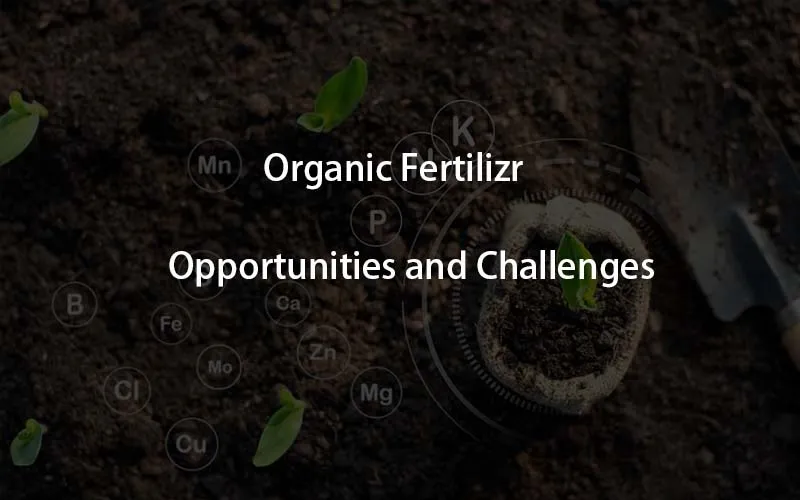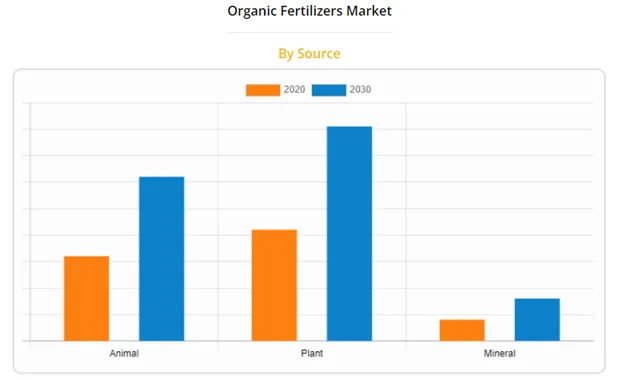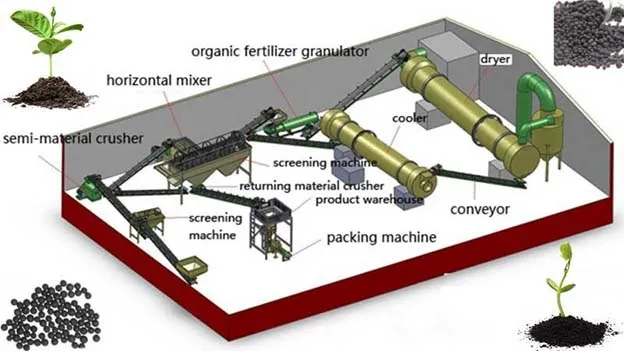
Organic Fertilizer: An In-depth Guide to its Opportunities and Challenges
In recent years, the demand for organic fertilizer has dramatically increased. While there are several reasons for this, environmental concerns and the adverse effect of chemical fertilizers on health are two primary ones. In addition, the sudden surge in the cost of chemical fertilizers has prompted farmers to switch to biofertilizers.
This blog explores the current trends of the global organic fertilizer market along with its opportunities and challenges.
Global Organic Fertilizer Market

Organic fertilizers are made out of animal manure, minerals, compost, and plant-based materials. Unlike chemical fertilizers, they release nutrients gradually. Therefore, they provide steady yet lasting nourishment to plants.
As organic farming and gardening have gained immense popularity, the use of organic fertilizer has also increased.
According to stats, the global organic fertilizer market was valued at $10.81 billion in 2022. By 2028, it is expected to exceed USD 22.13 billion. During this forecast period, the market will grow with a CAGR of 12.1%.

According to the report, plant-based organic fertilizer had the major market share in 2020.
Organic Fertilizer Global Trends
Since chemical fertilizers have adverse effects on humans and the environment, people are adopting organic farming practices. Consumers are ready to pay more for organic foods. In short, the global adoption of organic farming is boosting the demand for organic fertilizers.
Some current trends in the global organic fertilizer market are as per below:

Government Support
Government authorities worldwide are providing subsidies and incentives to promote organic farming. After all, people are becoming more conscious about the quality of food they consume.
Governments are not only providing financial support but also regulatory frameworks to support the use of bio-fertilizers.
Technological Advancements
The organic fertilizer industry is going through several technological advancements. Accountable authorities are doing various research and developments to produce efficient yet effective natural fertilizers.
Organic Fertilizer: Challenges and Opportunities
Organic fertilizers come with various opportunities and a fair share of challenges. Let’s learn about them.
Opportunities
Environmental Benefits
Organic fertilizers are environmentally friendly. Consequently, they have a considerable role in modern agriculture. As these fertilizers contain plant material, manure, and compost, they are biodegradable.
Unlike chemical fertilizers, they minimize the risk of groundwater contamination and soil degradation. Chemical fertilizers harm water quality of water bodies due to chemical strains.
Sustainable Agriculture
Organic fertilizers are also beneficial for soil health as they support microorganism in soil that fosters a healthy and sustainable soil ecosystem.
These fertilizers support sustainable farming practices. They improve the health and fertility of soil over time. As a result, the soil retains moisture and nutrients for a long time.
Minimizes the Dependency on Chemicals
Organic fertilizers reduce farmers’ dependency on synthetic chemicals and pesticides. It results in less impact on the environment.
The production of chemical fertilizers involves the burning of fossil fuels at a high temperature. It releases carbon dioxide in a substantial amount that contributes to greenhouse gas emissions.
Market Demand
The demand for organic foods is continuously growing. Therefore, farmers who practice organic farming can benefit from the premium prices of their agricultural produce. Companies that make fertilizers can leverage this opportunity. They can produce bio-fertilizers to meet the rising demand.
Challenges
Nutrient Variability
Since organic fertilizers have inconsistent nutrients, ensuring a consistent nutrient supply for crops can be challenging. As a result, careful monitoring and adjustment of application is crucial.
Storage and Handling
Storage and handling are two primary challenges of organic fertilizers. Since they contain manure and compost, they are bulky. Moreover, these fertilizers pose a risk of contamination.
Organic fertilizers, especially those made from animal sources, have odor, pathogens, and other contaminants. Consequently, they need proper storage and handling.
Certification Requirements
Individuals who want to market products as organic need to comply with strict standards. They will need to be involved in several compliances and paper checks.
Scope of Organic Fertilizer business? Is it Profitable?

If you see the stats of the global organic fertilizer market, it will look promising to you. It is going to become a big Industry in the coming years. Nevertheless, are we producing adequate organic fertilizer? The answer is no.
North America, Asia-Pacific, Europe, and LAMEA are the major markets for organic fertilizer. So there is a great scope for this business. Furthermore, the organic fertilizer business has relatively low competition.
Consider the following things before embarking on this business venture.
Check the Demand in Your Area
Though the demand for organic fertilizer is on the rise, you must research your targeted market. Get to know if farmers are interested in organic farming and if people want to buy organic food.
Have a Proper Fertilizer Business Plan
Make a comprehensive business plan that includes the estimate of investment cost, price of raw material supply, factory set-up cost, selection of fertilizer-making equipment, and operation cost.
Invest in the Quality Fertilizer Production Line
Invest in a quality fertilizer production line to ensure efficient operation and production consistency. It must include fermentation equipment, crusher, granulation equipment, mixer, screening equipment, cooling equipment, drying machine, coating equipment, and automatic packaging equipment.
Always choose a reputable and experienced manufacturer to buy these machines. Depending on the production capability, the price of an organic fertilizer production line may range between $30,000 and $300,000.
Marketing and Distribution
To a great extent, the sales and profitability of your organic fertilizer business depend on your marketing and distribution network. It is crucial to build a strong relationship with local farmers. Market your product to the target audience by all possible means. You can use both conventional and digital marketing methods.
Conclusion
Organic fertilizers are environmentally friendly offering numerous opportunities for sustainable agriculture and gardening. Undoubtedly, they come with some challenges. However, in the long run, they are beneficial for the environment, economy, and people’s health.
In this article, we learned about the growing demand for organic fertilizer. It won’t be wrong to mention that farmers can harness the potential of bio-fertilizers and grow crops organically to increase their income.
On the other hand, individuals and companies looking to come into organic fertilizer production can leverage the demand for organic foods. It is a promising market that can be substantially beneficial.
Talk to An Expert
SHARE THIS POST
Talk to An Expert
